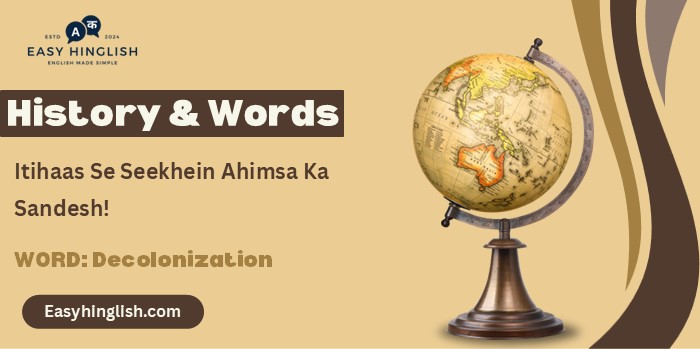History & Words: 'Decolonization' (October 12)
Welcome to 'History & Words.' Main Prashant hoon, Wordpandit aur Learning Inc. Network ka sansthapak. Yeh series meri bhasha seekhne ki lagan aur itihas ke prati ruchi ka sangam hai. Har kadi ek shabd aur uss se judi ek tithi par roshni daalti hai, jisse aapka shabdkosh badhta hai aur aap itihas ko gehraai se samajh paate hain. Aaiye, iss safar mein shabdon ke madhyam se samay mein pichhe chalein.
🔍 Aaj ka Shabd: Decolonization
Pronunciation: /diːˌkɒlənaɪˈzeɪʃən/ (dee-kol-uh-nahy-ZAY-shuhn)
🌍 Parichay (Introduction)
12 October 1968 ko West Central Africa mein ek historic moment witness hua jab Equatorial Guinea ne Spain se complete independence achieve ki. Yeh sirf ek small nation ka birth nahi tha – yeh Africa ke decolonization process ka final chapter mein se ek crucial page tha, aur global liberation movement ka powerful symbol tha.
Equatorial Guinea ka independence particularly significant tha kyunki yeh Spain ka last major African colony tha, aur Spanish colonial empire ka end mark kar raha tha jo 15th century se start hui thi. Francisco Macías Nguema first president ban gaye, aur yeh moment ne African continent par European control ke 500-year era ko symbolically close kar diya.
Decolonization sirf political independence nahi – yeh comprehensive transformation hai economic, social, cultural, aur psychological levels par. Yeh process ne 20th century ko reshape kar diya aur modern world order ki foundation rakhi. October 12 ka yeh date Columbus Day bhi hai, jo ironic parallel create karta hai colonization aur decolonization ke beech.
🌱 Shabd ka Utpatti (Etymology)
"Decolonization" relatively modern term hai jo 1960s mein mainstream vocabulary mein enter hua. "De-" prefix removal ya reversal indicate karta hai, "colonial" Latin "colonus" (farmer/settler) se aaya hai, aur "-ization" process ko denote karta hai. Literal meaning hai "reversing the process of colonization".
French "décolonisation" se English mein aaya, initially academic circles mein use hota tha. Political scientists aur historians ne is term ko develop kiya post-World War II era mein jab independence movements accelerate ho rahi thi. 1950s-60s mein yeh common political vocabulary ka hissa ban gaya.
Etymology mein power dynamics hidden hain – colonization active process tha European powers dwara, aur decolonization uska conscious reversal hai colonized peoples dwara. Word formation hi agency aur resistance ko emphasize karti hai.
📖 Mahatvapurn Shabdavali (Key Vocabulary)
- 🔑 Self-determination – Right of peoples to decide their political status aur governance
- 🔑 Neo-colonialism – Practice of using economic/political pressure instead of direct control
- 🔑 Liberation Movement – Organized struggle against colonial rule
- 🔑 Mandate System – League of Nations framework for administering former colonies
- 🔑 Non-Aligned Movement – Group of countries avoiding Cold War alignment
🏛️ Itihasik Sandarbh (Historical Context)
Decolonization ka roots World War I mein trace kiya ja sakta hai jab Wilson's Fourteen Points ne self-determination principle introduce ki. Russian Revolution (1917) ne anti-imperialist ideology ko boost diya. League of Nations ka mandate system traditional colonialism ko question karne laga.
World War II decisive turning point tha. European powers significantly weakened ho gaye, United States aur Soviet Union anti-colonial stance adopt kar rahe the, aur colonized peoples ne war effort mein contribute karke equal treatment ka demand rakha. Atlantic Charter (1941) ne self-determination ko war aim declare kiya.
India's independence (1947) ne decolonization wave trigger kiya. Mahatma Gandhi ke non-violent resistance ne global template provide kiya. Indonesia (1945), Philippines (1946), Burma (1948) jaise deshon ne follow kiya. Asian decolonization African movements ko inspire karne laga.
African decolonization 1950s-60s mein accelerate hua. Ghana (1957) under Kwame Nkrumah Sub-Saharan Africa mein first bana. 1960 ko "Year of Africa" kaha jaata hai kyunki 17 African countries ne independence achieve ki. French colonies mein mostly peaceful transition hua, jabki British, Belgian, Portuguese territories mein varied experiences the.
Cold War dynamics decolonization ko complicate karte the. Superpowers newly independent countries ko their sphere mein bring karne ki competition mein the. Non-Aligned Movement (1955) alternative path offer kar raha tha Bandung Conference ke through.

⏳ Samayrekha (Timeline)
- 1776 – American independence sets early decolonization precedent
- 1804 – Haiti becomes first independent Latin American nation
- 1947 – India and Pakistan gain independence
- 1957 – Ghana becomes first sub-Saharan African nation to gain independence
- 1960 – "Year of Africa" - 17 African nations gain independence
- 1961 – Non-Aligned Movement formally established
- 12 Oct 1968 – Equatorial Guinea gains independence from Spain
- 1975 – Portuguese colonies (Angola, Mozambique) gain independence
- 1990 – Namibia becomes last African colony to gain independence
🌟 Is Din ka Mahatva (The Day's Significance)
12 October 1968 ko Equatorial Guinea ka independence multiple layers ka significance carry karta tha. Spain ke liye yeh imperial era ka end tha. Christopher Columbus ka 1492 ka voyage October 12 ko hi hua tha, aur exactly 476 years later Spanish colonialism ka last major African chapter close ho raha tha. Historical irony profound tha.
Francisco Macías Nguema first president bane, lekin independence euphoria short-lived tha. Nguema regime brutal dictatorship mein transform ho gaya, jo decolonization ki complex challenges ko demonstrate karta tha. Political independence automatically good governance guarantee nahi karti.
International context mein 1968 turbulent year tha – Vietnam War, Prague Spring, Student protests global level par ho rahe the. Equatorial Guinea ka independence broader liberation movements ka part tha jo established order ko challenge kar rahe the. African unity ka momentum peak par tha.
Economic challenges immediate the. Cocoa and coffee plantations Spanish control mein the, infrastructure limited tha, aur educated population very small tha. Colonial legacy development patterns ko constrain kar raha tha. Neo-colonial relationships establish hone ka risk tha.
Cultural dimension equally important tha. Fang, Bubi, Annobónese jaise indigenous cultures ko reclaim karna tha Spanish cultural dominance ke after. Language policy, education system, legal framework – sab kuch decolonize karna tha. Identity formation complex process tha.
Regional impact significant tha. Equatorial Guinea Central African region mein last European colony tha. Neighboring countries like Cameroon, Gabon, Congo bhi recently independent the. Regional cooperation aur African solidarity ke liye complete decolonization necessary tha.
💬 Prasiddh Ukti (Quote)
"The wind of change is blowing through this continent, and whether we like it or not, this growth of national consciousness is a political fact." — Harold Macmillan (British Prime Minister, addressing South African Parliament, 1960)
🔮 Aaj Ka Matlab aur Chintan (Modern Usage and Reflection)
Aaj decolonization concept broader contexts mein use hota hai. Academic decolonization universities mein Eurocentric curricula ko challenge kar raha hai. Indigenous knowledge systems ko mainstream karne ka movement hai. "Decolonizing the mind" intellectual liberation ka symbol ban gaya hai.
Economic decolonization still ongoing struggle hai. Many African countries resource extraction ke liye former colonial powers par dependent hain. Land grabbing, unfair trade agreements, debt dependency neo-colonial forms hain. Structural adjustment programs sovereignty ko limit karte hain.
Cultural decolonization museums, art, literature mein visible hai. Repatriation of artifacts, indigenous storytelling, local languages promotion – sab decolonization efforts hain. Digital decolonization bhi emerging field hai technology access aur representation ke baare mein.
🏛️ Virast (Legacy)
Equatorial Guinea ka post-independence trajectory decolonization ki complexities ko illustrate karta hai. Nguema dictatorship (1968-1979) brutal tha, Teodoro Obiang ka current rule authoritarian hai. Oil wealth elite capture ho gaya hai. Political decolonization successful tha, but democratic governance elusive raha.
Global decolonization ne United Nations ko transform kiya. 1945 mein 51 founding members se 1970s tak 150+ members ho gaye. General Assembly mein Global South ka strong voice develop hua. International law mein self-determination fundamental principle ban gaya.
Non-Aligned Movement decolonization ka direct product tha. Bandung spirit South-South cooperation ka foundation bana. G-77, African Union, ASEAN jaise regional organizations decolonized countries ki collective strength represent karte hain.
🔍 Tulnatmak Vishleshan (Comparative Analysis)
1968 mein decolonization political independence par focused tha. Today, focus comprehensive liberation par hai – economic, cultural, intellectual, psychological. Flag independence se substantive sovereignty tak ka journey ongoing hai.
Cold War era mein decolonization bipolar competition se influenced tha. Post-Cold War mein globalization ne new challenges create kiye hain. Sovereignty ki traditional concept global governance se challenged hoti hai.
💡 Kya Aapko Pata Hai? (Did You Know?)
🎓 Antim Vichar (Conclusion)
Decolonization sirf historical process nahi – yeh ongoing struggle hai comprehensive liberation ke liye. 12 October 1968 ko Equatorial Guinea ka independence political decolonization ka completion tha, lekin economic, cultural, intellectual decolonization still work in progress hai. Aaj jab global inequalities persist karti hain, neo-colonial relationships exist karte hain, aur indigenous voices marginalized hote hain, tab decolonization spirit relevant aur necessary hai. True freedom multidimensional hai aur continuous effort require karti hai.
📚 Aage Padhne ke Liye (Further Reading)
- 📖 The Wretched of the Earth – Frantz Fanon
- 📖 How Europe Underdeveloped Africa – Walter Rodney
- 📖 Decolonising the Mind – Ngũgĩ wa Thiong'o








